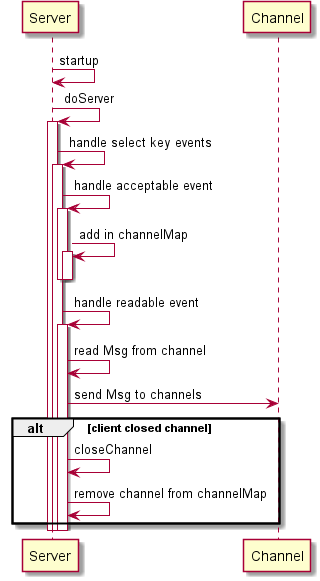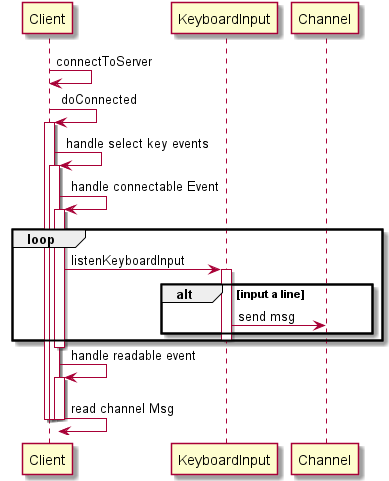TOC
Nio 聊天室
本篇文章运用 NIO 实现一个简易的聊天室功能,目的是为了整合一下最近学习 NIO 中的 Channel, Buffer, Selector 的功能;
实现逻辑大概如下:
服务端:
- 启动一个 ServerSocketChannel,同时注册 OP_ACCEPT 事件至 Selector 中;
- 循环监听 selector 中的事件
- 处理 channel 连接事件
- 处理 channel 可读事件,接收客户端发送的消息
服务端需要注意的一个地方是,如果客户端断开连接,会产生一个可读事件,而此时再调用 channel 的 read 方法会抛出 IOException,此时需要处理异常关闭 channel 和 解除 key 与 selector 的监听绑定
客户端:
- 启用一个 SocketChannel 连接 Server 端,同时注册 OP_ACCEPT 事件至 Selector
- 循环监听 selector 中的事件
- 处理 channel 连接事件
- 注册 OP_READ 事件至 Selector
- 循环监听客户端键盘输入,发送输入消息指服务端
- 处理 channel 可读事件,接收服务端发送的消息
- 处理 channel 连接事件
代码实现
服务端实现

public class NioChatServer {
private static Map<String, SocketChannel> channelMap = new HashMap<>();
private static Selector selector;
public static void main(String[] args) throws Exception {
startUp();
while (true) {
doServer();
}
}
public static void startUp() throws Exception {
ServerSocketChannel serverSocketChannel = ServerSocketChannel.open();
serverSocketChannel.configureBlocking(false);
serverSocketChannel.bind(new InetSocketAddress("127.0.0.1", 8989));
selector = Selector.open();
serverSocketChannel.register(selector, SelectionKey.OP_ACCEPT);
}
public static void doServer() throws IOException {
selector.select();
Set<SelectionKey> selectionKeys = selector.selectedKeys();
selectionKeys.forEach(NioChatServer::handleSelectKey);
selectionKeys.clear();
}
private static void handleSelectKey(SelectionKey key) {
try {
if (key.isAcceptable()) {
handleAcceptable(key);
} else if (key.isReadable() && key.isValid()) {
handleReadable(key);
}
} catch (IOException e) {
}
}
private static void handleAcceptable(SelectionKey key) throws IOException {
ServerSocketChannel serverChannel = (ServerSocketChannel) key.channel();
SocketChannel clientChannel = serverChannel.accept();
clientChannel.configureBlocking(false);
clientChannel.register(selector, SelectionKey.OP_READ);
String keyStr = UUID.randomUUID().toString();
System.out.println(clientChannel + ": " + keyStr);
channelMap.put(keyStr, clientChannel);
}
private static void handleReadable(SelectionKey key) {
SocketChannel clientChannel = (SocketChannel) key.channel();
String keyStr = getChannelKey(clientChannel);
try {
clientChannel.configureBlocking(false);
String msg = readMsg(clientChannel);
System.out.println(keyStr + ": " + msg);
sendMsg(keyStr + ": " + msg);
} catch (IOException e) {
try {
clientChannel.close();
clientChannel.socket().close();
key.cancel();
channelMap.remove(keyStr);
System.out.println(keyStr + ": 断开连接");
} catch (IOException e1) {
e1.printStackTrace();
}
}
}
private static String readMsg(SocketChannel clientChannel) throws IOException {
ByteBuffer buffer = ByteBuffer.allocate(1024);
int read = clientChannel.read(buffer);
if (read <= 0) {
return null;
}
buffer.flip();
Charset charset = Charset.forName("utf-8");
return String.valueOf(charset.decode(buffer).array());
}
private static void sendMsg(String msg) throws IOException {
for (Map.Entry<String, SocketChannel> m : channelMap.entrySet()) {
SocketChannel client = m.getValue();
ByteBuffer writeBuffer = ByteBuffer.allocate(1024);
writeBuffer.put((msg).getBytes());
writeBuffer.flip();
client.write(writeBuffer);
}
}
private static String getChannelKey(SocketChannel clientChannel) {
String keyStr = "";
for (Map.Entry<String, SocketChannel> m : channelMap.entrySet()) {
if (m.getValue().equals(clientChannel)) {
keyStr = m.getKey();
}
}
return keyStr;
}
}
客户端实现

public class NioChatClient {
private static Selector selector;
public static void main(String[] args) throws Exception {
connectToServer();
while (true) {
doConnected();
}
}
public static void connectToServer() throws Exception {
SocketChannel socketChannel = SocketChannel.open();
socketChannel.configureBlocking(false);
selector = Selector.open();
socketChannel.register(selector, SelectionKey.OP_CONNECT);
socketChannel.connect(new InetSocketAddress("127.0.0.1", 8989));
}
private static void doConnected() throws IOException {
selector.select();
Set<SelectionKey> keySet = selector.selectedKeys();
for (SelectionKey selectionKey : keySet) {
if (selectionKey.isConnectable()) {
handleConnectable(selectionKey);
} else if (selectionKey.isReadable()) {
handleReadable(selectionKey);
}
}
keySet.clear();
}
private static void handleReadable(SelectionKey selectionKey) throws IOException {
SocketChannel client = (SocketChannel) selectionKey.channel();
ByteBuffer readBuffer = ByteBuffer.allocate(1024);
int read = client.read(readBuffer);
if (read <= 0) {
return;
}
readBuffer.flip();
Charset charset = Charset.forName("utf-8");
String msg = String.valueOf(charset.decode(readBuffer).array());
System.out.println(msg);
}
private static void handleConnectable(SelectionKey selectionKey) throws IOException {
SocketChannel client = (SocketChannel) selectionKey.channel();
if (client.isConnectionPending()) {
client.finishConnect();
ByteBuffer writerBuffer = ByteBuffer.allocate(1024);
writerBuffer.put((LocalDateTime.now() + ": 连接成功").getBytes());
writerBuffer.flip();
client.write(writerBuffer);
listenKeyboardInput(client);
}
client.register(selector, SelectionKey.OP_READ);
}
private static void listenKeyboardInput(SocketChannel client) {
ExecutorService service = Executors.newSingleThreadExecutor();
service.submit(() -> {
ByteBuffer writerBuffer = ByteBuffer.allocate(1024);
while (true) {
BufferedReader br = new BufferedReader(new InputStreamReader(System.in));
try {
writerBuffer.clear();
String line = br.readLine();
writerBuffer.put(line.getBytes());
writerBuffer.flip();
client.write(writerBuffer);
} catch (IOException e) {
e.printStackTrace();
}
}
});
}
}
运行结果


